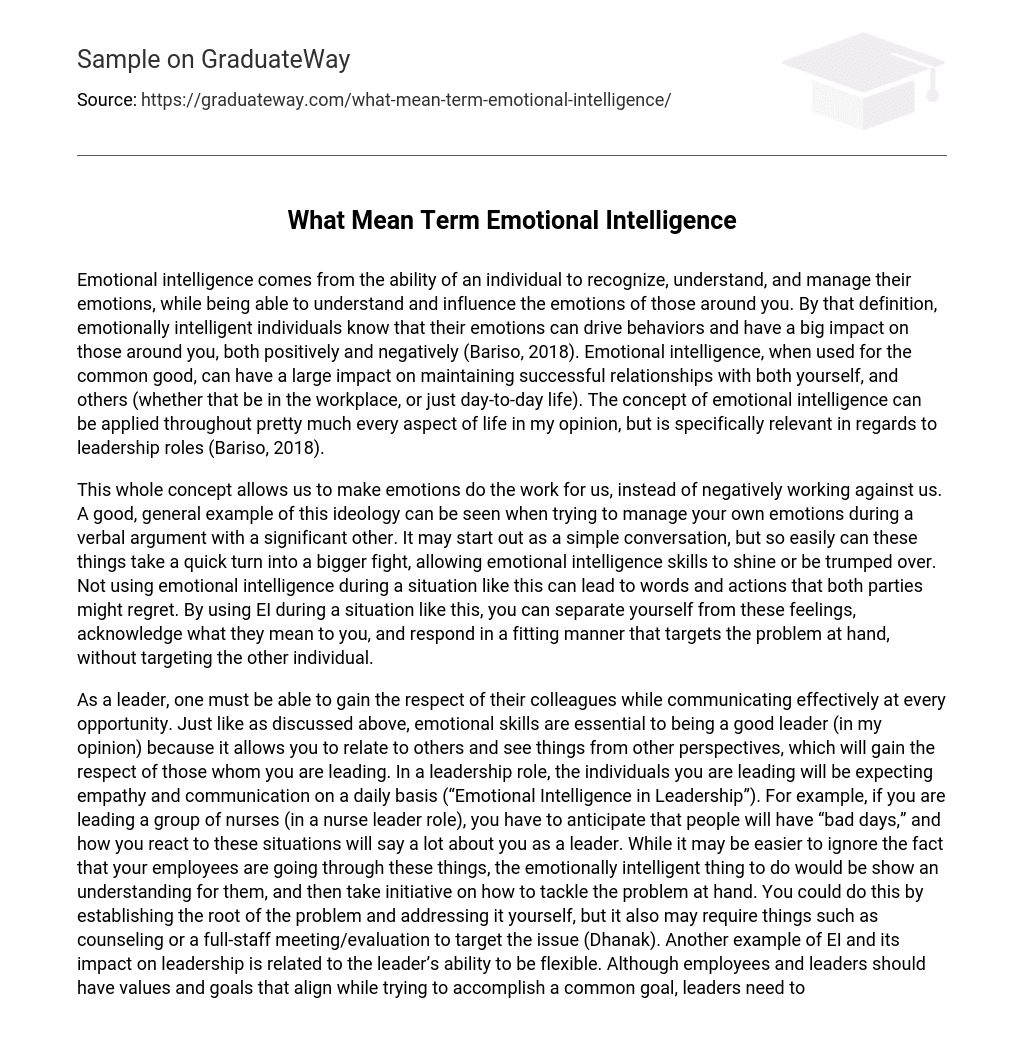Emotional intelligence comes from the ability of an individual to recognize, understand, and manage their emotions, while being able to understand and influence the emotions of those around you. By that definition, emotionally intelligent individuals know that their emotions can drive behaviors and have a big impact on those around you, both positively and negatively (Bariso, 2018). Emotional intelligence, when used for the common good, can have a large impact on maintaining successful relationships with both yourself, and others (whether that be in the workplace, or just day-to-day life). The concept of emotional intelligence can be applied throughout pretty much every aspect of life in my opinion, but is specifically relevant in regards to leadership roles (Bariso, 2018).
This whole concept allows us to make emotions do the work for us, instead of negatively working against us. A good, general example of this ideology can be seen when trying to manage your own emotions during a verbal argument with a significant other. It may start out as a simple conversation, but so easily can these things take a quick turn into a bigger fight, allowing emotional intelligence skills to shine or be trumped over. Not using emotional intelligence during a situation like this can lead to words and actions that both parties might regret. By using EI during a situation like this, you can separate yourself from these feelings, acknowledge what they mean to you, and respond in a fitting manner that targets the problem at hand, without targeting the other individual.
As a leader, one must be able to gain the respect of their colleagues while communicating effectively at every opportunity. Just like as discussed above, emotional skills are essential to being a good leader (in my opinion) because it allows you to relate to others and see things from other perspectives, which will gain the respect of those whom you are leading. In a leadership role, the individuals you are leading will be expecting empathy and communication on a daily basis (“Emotional Intelligence in Leadership”). For example, if you are leading a group of nurses (in a nurse leader role), you have to anticipate that people will have “bad days,” and how you react to these situations will say a lot about you as a leader. While it may be easier to ignore the fact that your employees are going through these things, the emotionally intelligent thing to do would be show an understanding for them, and then take initiative on how to tackle the problem at hand. You could do this by establishing the root of the problem and addressing it yourself, but it also may require things such as counseling or a full-staff meeting/evaluation to target the issue (Dhanak). Another example of EI and its impact on leadership is related to the leader’s ability to be flexible. Although employees and leaders should have values and goals that align while trying to accomplish a common goal, leaders need to realize that success lies within establishing a rapport to work with their employees, not focusing on imposing restrictions and micro-managing whenever possible (Dhanak). That example especially hits home with me because I feel like it’s something you see far too often, especially in the hospital setting in my experience. When I was on one of the floors at my clinical site last semester I came across a nurse leader who blatantly micromanaged one of the nurses I was placed with. After just a few hours with this nurse, I was able to see how upsetting it was to her to be treated this way, and she even said sometimes when it really gets to her, it makes her feel not competent enough to do her own job, which is quite unfortunate.
My EI results showed “slightly above average EQ-with room to grow!” It talked more about being able to tune into my own needs and emotions, not just the emotions of others. And truly, I think that is something that I already knew was one of my weak points. I’m really good at acknowledging the emotions of those around me, and how to react to them, but sometimes use that as a crutch to avoid my own and take charge of my own emotions. To increase my emotional intelligence (or EQ in this case), I plan to focus on being more mindful to my emotions and really evaluate what causes stress/negative emotions for me, and how I react to those emotions. From there, I should be able to also become more mindful and redirect my negative coping mechanisms as well. I also plan on just working on becoming more aware of my emotions during stressful situations and try to remain calm (er) when these situations come up so that I can increase my emotional intelligence.





